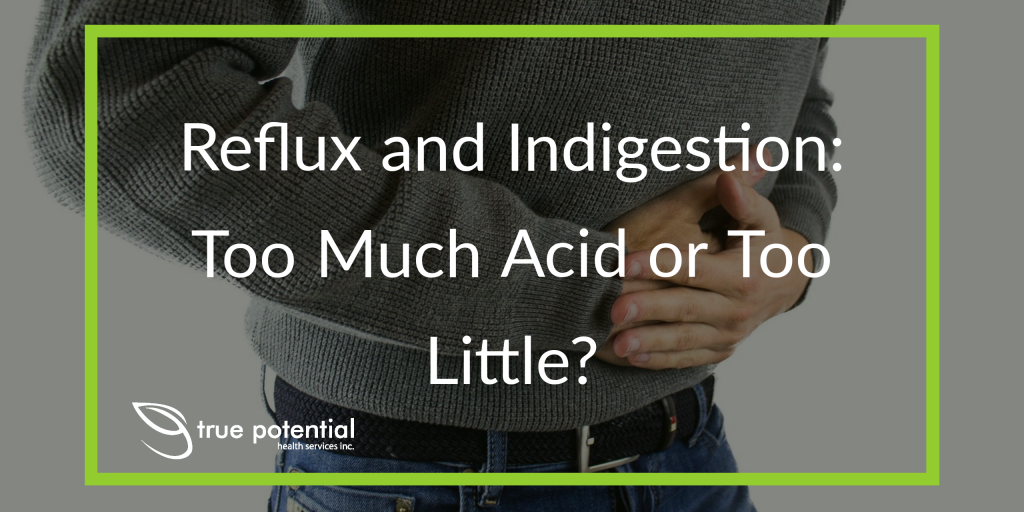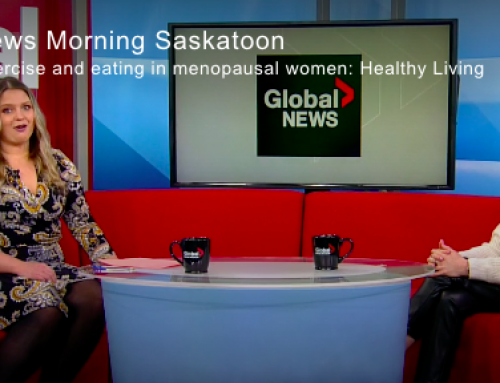The conventional approach to heartburn, reflux, and indigestion involves the suppression of our stomach acid using either over-the-counter or prescription antacids. This approach assumes that these symptoms are the result of too much stomach acid, and the medications work in the sense that they reduce your stomach acid to the point that there isn’t enough of it to get into the esophagus and cause that burning discomfort. This can be a helpful intervention to break the cycle of reflux and damage to the esophagus, but it is really meant to be a short term (i.e. a month or two) solution. In the long term, suppression of stomach acid is risky because we need stomach acid to absorb and digest protein and many minerals, including zinc, calcium, and iron. Long term use of medications such as ranitidine, pantoprazole, Prilosec, and others comes with the possibility of increased fracture risk, anemia, and dementia (among other things), because we are compromising the absorption of key nutrients in our diet(1). Use of these medications can also lead to an imbalance in our gut flora over time (also known as dysbiosis), because stomach acid is one of the main ways that our digestive tract kills harmful microbes (like c. difficile) that want to get through and upset the balance of the healthy ones(2).
Low Stomach Acid can cause Digestive Issues
You might be surprised to hear that most cases of heartburn, indigestion, and reflux are actually the result of LOW stomach acid. In my practice I have never seen a patient with any of these digestive symptoms that actually had too much stomach acid (although I am sure a few must exist somewhere!). How can this be? Here’s the main reason: one of the jobs of our stomach acid is to stimulate the closing of the sphincter between the stomach and the esophagus(3). When your stomach acid starts to get low, the sphincter gets weak and doesn’t close properly, and the little stomach acid you do have can splash up into your esophagus and cause burning and discomfort. Low stomach acid also slows down your ability to digest your food, resulting in indigestion and overfullness symptoms as food stays in your stomach longer than it should.
Eating on the Go can cause Low Stomach Acid
Low stomach acid is a common issue these days, mainly because our lifestyle does not place importance on rest and relaxation during meal times. When we eat quickly or “on the go”, we are not shifting our body out of “fight or flight” mode and into its opposite state: “rest and digest.” In rest and digest mode, blood is prioritized to the digestive tract in order to stimulate the production of digestive fluids such as stomach acid. When we eat in fight or flight mode, we are not properly stimulating the production or release of stomach acid. Over time, that reduced flow of stomach acid causes us to absorb less zinc (among other things), and since zinc is needed to MAKE stomach acid, as our zinc levels drop, so does our ability to make stomach acid. This becomes a negative feedback cycle that leads to worsening reflux and digestive symptoms over time.
To break this cycle, we need to do the opposite of what we have been taught: increase our stomach acid (and sometimes supplement with zinc too!). When you come to see me for a visit and you have symptoms of heartburn, reflux, or indigestion, that is often where we start. If you have an irritated esophagus from reflux or signs of an ulcer (stomach pain after eating, black stools, etc.), often the first thing we need to do is heal the lining of these organs first so they will tolerate the increase in acidity without further irritation or damage. This is a place where medications can be useful – sometimes it is necessary to further reduce your stomach acid in order to allow tissues to heal. But again, this is a temporary solution that eventually allows us to increase your stomach acid to truly solve the problem and relieve you of your symptoms.
If you have symptoms of heartburn, reflux, or indigestion, OR if you have been on acid-reducing medications and now have other, new digestive symptoms, consider booking an appointment so we can get to the bottom of things. We can heal the lining of your digestive tract, rebalance your gut bacteria, and optimize your stomach acid to get rid of your symptoms and prevent them from returning. I look forward to supporting you should you trust me with your health journey.
References:






